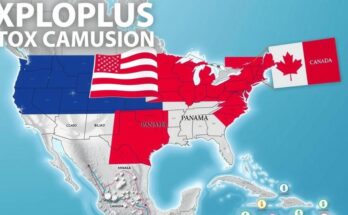As the U.S. election nears, Mexico has escalated its border enforcement, significantly reducing migrant crossings to the U.S. A tacit agreement between the nations, shaped by the Biden administration, emphasizes Mexico’s economic interests and political pressures. Stricter asylum policies and increased deportations have led to a dramatic decline in migrant encounters, raising ethical concerns about the treatment of those seeking refuge.
As the United States inches closer to the upcoming presidential election, Mexico has intensified its border enforcement policies, significantly decreasing the flow of migrants attempting to reach the U.S. border. Analysts attribute this shift to a tacit agreement between the United States and Mexico, established by the Biden-Harris administration in late 2023, which aligns with Mexico’s economic interests and the political landscape surrounding the election. Illegal crossings at the southern U.S. border have dropped dramatically, from nearly 250,000 encounters in December 2023 to below 60,000 in September 2024. Key to this reversal has been Mexico’s proactive measures, including enhanced immigration checkpoints, which are seen as politically motivated due to the stakes involved for the Biden administration, particularly with Vice President Kamala Harris’ perceived vulnerabilities regarding immigration issues. President Claudia Sheinbaum of Mexico is cognizant of the implications that migrant flows can have on the U.S. elections and appears committed to maintaining order at the border. This enforcement is not only politically strategic for Sheinbaum but also economically beneficial for Mexico, as the nation relies heavily on its trade relations with the U.S. The restrictions imposed by Mexico include increased visa requirements for certain nationalities and stricter asylum regulations. Moreover, the Mexican government has ramped up deportations and migration enforcement operations throughout the country, effectively utilizing a system colloquially referred to as the “migrant carousel.” This approach exhausts migrants by repeatedly returning them to southern Mexico, aiming to prevent them from reaching the northern border. Despite these measures, the human cost is significant. Many migrants, like the Sarmiento family from Venezuela, find themselves trapped in Mexico, enduring precarious living conditions while awaiting appointments to present their cases for asylum through U.S. systems. The shift in Mexico’s approach to handling migrants raises ethical questions regarding the treatment of vulnerable populations and the sacrifices made to strengthen bilateral cooperation with the U.S. As the election approaches, it remains to be seen whether the new leadership in Mexico will maintain these rigorous enforcement policies, considering the potential implications for future U.S.-Mexico relations and the welfare of migrants caught in this geopolitical landscape.
The article discusses the recent changes in Mexico’s border enforcement strategy in response to the increasing political pressures associated with the upcoming U.S. presidential election. It highlights the interplay between Mexico’s immigration policies and its economic incentives to maintain stable relations with the United States, particularly in light of rising migrant encounters at the U.S. border. By contextualizing the actions of the Mexican government within the political landscape of both nations, the article elucidates the motivations behind these policy shifts.
In conclusion, the current dynamics between the U.S. and Mexico regarding border enforcement underscore a complex interaction of political, economic, and humanitarian factors. Mexico’s increased border security not only seeks to control migrant flows but is also influenced by the political climate in the U.S. as the election approaches. This situation raises critical discussions about the treatment of migrants, the ethical implications of using immigration as a political tool, and the future of U.S.-Mexico relations.
Original Source: www.usatoday.com




